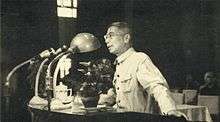Guo Yonghuai
Guo Yonghuai, or Yung-huai Kuo (Chinese: 郭永怀; April 4, 1909 – December 5, 1968) was a Chinese aerospace engineer. He was an expert in aerodynamics.
Guo Yonghuai Yung-huai Kuo | |
|---|---|
 Guo in 1961 | |
| Born | 4 April 1909 |
| Died | 5 December 1968 (aged 59) |
| Nationality | Chinese |
| Spouse(s) | Li Pei |
| Awards | Two Bombs and One Satellite Achievement Medal (1999) |
| Scientific career | |
| Fields | Aerodynamics |
Biography
Guo was born in Rongcheng, Shandong, and graduated from the department of physics of Peking University in 1935. He enrolled in an oversea program in 1939 and entered the University of Toronto in Canada in 1940 and obtained a master's degree there. From 1941 to 1945, Guo studied compressible hydrodynamics at Caltech. After obtaining the Ph.D degree, he stayed there as a research fellow. From 1946, he became an associate professor and later, professor at Cornell University. Invited by Tsien Hsue-shen, Guo returned to China in October 1956 and became the vice director of the Institute of Mechanics of the Chinese Academy of Sciences (CAS).
Guo was a founder of mechanics in mainland China and made significant contributions to mechanics, applied mathematics and aeronautics. In 1958, he helped found the University of Science and Technology of China and served as the chair of the department of Chemical Physics.
Since May 1960, Guo served as vice director of Beijing Ninth Research Institute of the Second Ministry of Industry, and became a leader of China's atomic and hydrogen bomb projects. He led work in explosive mechanics, high-pressure physical property equations, aerodynamics, aeronautics, structural mechanics, and weapon experimental environment, and solved a series of important problems. In December 1982, China's Science Press published The Works of Guo Yonghuai.
Guo married the linguist Li Pei. They had one daughter. He died of a plane crash near Beijing Capital International Airport on December 5, 1968, when traveling from Qinghai to Beijing[1]. When crashing, he and his guard, Mou Fangdong, protected the data from being destroyed.
Awards and honors
In 1985, he was awarded a Grand Prize of National Science and Technology Advancement. In 1999, Guo won the Two Bombs, One Satellite Achievement Medal. In 2018, the asteroid 212796 Guoyonghuai was named in his memory.
- 北京市地方志编纂委员会 (2000). 北京志·市政卷·民用航空志. 北京出版社. p. 288. ISBN 7-200-04040-1.